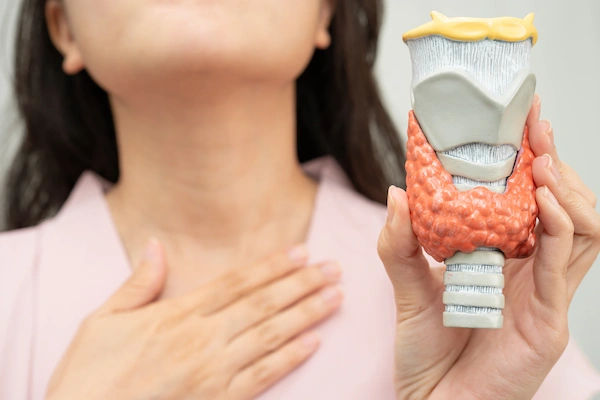Common Symptoms Of Thyroid In Females
Symptoms of thyroid in females can be different in women than in men. Read to know more about these signs and understand when to consult a specialist.

Written by Dr Sonia Bhatt
Last updated on 13th Jan, 2026
The thyroid, a small butterfly-shaped gland located at the base of the neck, plays a key role in managing various bodily functions. Despite its size, it is the key regulator of metabolism and energy production in the body. Also, it produces essential hormones like triiodothyronine (T3) and thyroxine (T4) that influence the functioning of the entire body.
While this gland is important for everyone, it requires extra care in women. This is because hormonal fluctuations during menstruation, pregnancy, and menopause make women more susceptible to thyroid-related health problems. Notably, a malfunctioning thyroid can significantly impact physical, emotional, and reproductive health.
Therefore, knowing the types and symptoms of thyroid disorders in females can help you detect the condition early and find the right treatment, enabling you to lead a normal life again.
Types of Thyroid Disorders in Females
There are two types of thyroid disorders observed in females. Here are the details –
1. Hypothyroidism
Hypothyroidism is a condition where the thyroid gland fails to produce enough hormones. Hence, it slows down bodily functions. This condition is also associated with Hashimoto's thyroiditis, an autoimmune disorder where the immune system attacks the thyroid gland considering it as a foreign body.
Further, the causes of hypothyroidism can include iodine deficiency, thyroiditis, exposure to radiation, etc. As a result, it leads to various heart problems, goitre, infertility, and complicated pregnancy, amongst other issues.
2. Hyperthyroidism
On the other hand, hyperthyroidism is a condition where the thyroid gland produces excessive hormones. It accelerates various bodily functions and is commonly associated with Graves' disease, another autoimmune disorder.
The common causes of hyperthyroidism include overconsumption of iodine, lack of sleep, and excessive intake of thyroid medication. If left untreated, hyperthyroidism may lead to Graves’ ophthalmopathy, heart problems (stroke, blood clots, etc.), osteoporosis, and fertility issues.
Common Symptoms of Hypothyroidism in Females
Some of the common symptoms of hypothyroidism in females are –
1. Fatigue and sluggishness: One of the hallmark symptoms of hypothyroidism is continuous fatigue. In this case, the person may feel sluggish, even after a full night's rest, due to the body's decreased energy production.
2. Weight gain and difficulty losing weight:
This is characterized by unexplained and sudden weight gain that is resistant to diet change and exercise. This may occur in response to a lowered metabolic rate due to the lack of thyroid hormones, making it difficult to burn calories.
3. Cold intolerance: Women with hypothyroidism often feel excessively cold, even in warm environments. This occurs because the thyroid's role in regulating body temperature is compromised.
4. Mood swings and depression: In the case of hypothyroidism, the underproduction of hormones slows down different bodily functions. This leads to feelings of sadness, hopelessness, and depression. Women with this condition can find it difficult to enjoy activities they once loved or feel motivated in their daily lives.
5. Difficulty concentrating: in the case of hyperthyroidism, the overstimulation of the brain leads to the inability to concentrate due to racing thoughts, restlessness, or heightened nervous energy.
6. Memory Issues: In hypothyroidism, the neural activity may slow down leading to the habit of forgetfulness. So, affected individuals may feel that they cannot remember anything or stay attentive during conversations.
Common Symptoms of Hyperthyroidism in Females
Some of the popular symptoms of hyperthyroidism in females are –
1. Rapid weight loss: Since hyperthyroidism boosts metabolism, it leads to involuntary weight loss despite increased appetite. As a result, it can lead to significant nutritional imbalances if left unattended.
2. Nervousness and anxiety: Extra production of hormones overstimulates the nervous system, resulting in anxiety, irritability and restlessness.
3. Heat intolerance: Women with hyperthyroidism experience excessive sweating as their body’s thermostat remains in overdrive.
4. Irritability & anger issues: In hyperthyroidism, the bodily functions accelerate as it produces more hormones than required. It puts the neural activities in overdrive, leading to heightened irritability, anxiety, or sudden outbursts of anger. Women may find themselves overwhelmed in a rather manageable situation.
Diagnosing Thyroid Disorders In Females
The diagnosis of thyroid disorder in females includes two major facets:
1. Blood tests for thyroid levels
This involves measuring T3, T4, and thyroid-stimulating hormone (TSH) levels present in blood. High TSH and low T3 and T4 indicate hypothyroidism, while the opposite scenario may suggest hyperthyroidism.
2. Physical examinations and family history
Apart from blood tests, doctors also conduct physical check-ups to look for goitre and lumps in the region. Also, they ask and review the patient’s family medical history to see if such conditions prevail in the family. The reason is that thyroid disorders often have a genetic component attached to them.
Other Signs of Thyroid in Females
Other common symptoms of thyroid disorders that can be seen in women include:
Hair and skin issues: Women suffering from thyroid conditions will face different hair and skin-related issues. Hypothyroidism may cause dry, coarse hair and skin, while hyperthyroidism can lead to thinning hair and increased sweating.
- Swelling in the neck (goitre): Similarly, the swelling of the neck, which is classified as goitre, is also a sign of thyroid disorder. Usually, it indicates an iodine deficiency or the presence of nodules.
- Menstrual irregularities: Thyroid disorders disrupt the menstrual cycle, leading to other complications. While hypothyroidism leads to heavy or irregular periods, hyperthyroidism means lighter or missed periods.
- Impact on fertility: Thyroid imbalances also affect ovulation and fertility. Women with unattended thyroid conditions will struggle to conceive and face difficulties during pregnancy.
When to See a Doctor?
Well, in the case of thyroid disorders, one must see the doctor as soon as possible. So, here are some reference points to keep an eye out for:
1. Persistent symptoms and their impact on daily life
If the symptoms of thyroid disorders persist for a longer duration, then consulting a doctor is essential.
2. Evaluation by an endocrinologist
An endocrinologist specialises in hormone-related conditions, and consulting them can help patients get customised solutions. Depending on test results, they can provide a tailored treatment plan that addresses particular problems instead of offering a generic solution.
Conclusion
Thyroid disorder is common among females which can significantly affect their physical, emotional and reproductive health. Therefore, recognising the symptoms and acknowledging the condition is the first step towards its effective management. Furthermore, early diagnosis of the condition paves the way for the proper treatment and living a healthy life. So, by comprehending the symptoms and securing timely medical intervention, women can easily mitigate the impact of thyroid disorders in their lives and live happily.
Consult Apollo’s Endocrinologist
Consult Apollo’s Endocrinologist

Dr. E Prabhakar Sastry
General Physician/ Internal Medicine Specialist
40 Years • MD(Internal Medicine)
Manikonda Jagir
Apollo Clinic, Manikonda, Manikonda Jagir
(175+ Patients)

Dr. Arunava Ghosh
General Physician/ Internal Medicine Specialist
10 Years • MBBS,MD(GENL.MED.),DM(ENDOCRINOLOGY)
Kolkata
VDC Clinic, Kolkata

Dr. Shruthi B
Endocrinologist
20 Years • MBBS,MD ( GEN MED) DM (ENDOCRIONOLOGY)
Bengaluru
Apollo Clinic, JP nagar, Bengaluru
Aditya Singh
Endocrinologist
8 Years • MBBS
Bengaluru
Apollo One Electronic City, Bengaluru

Dr. Chaithanya R
Internal Medicine Specialist Diabetologist
16 Years • MBBS, MD Internal Medicine, Fellowship in Diabetes(UK), CCEBDM(PHFI)
Bangalore
Apollo Clinic Bellandur, Bangalore
(75+ Patients)

